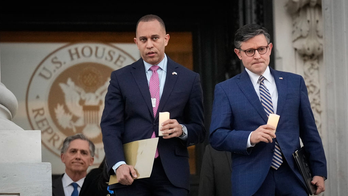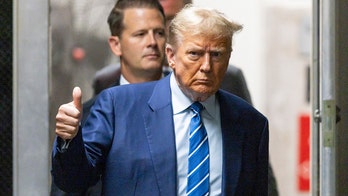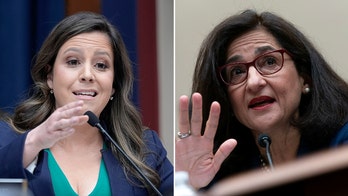Romney vs. Obama in First Presidential Debate
The first presidential debate of the campaign will be held in a state that represents a microcosm of the nation.
Denver, Colorado – The first debate of the presidential campaign will be taking place in a state that tipped in favor of President Barack Obama in 2008, when he became only the second Democrat to win Colorado since 1964.
It is also where, like the rest of the country, unemployment is high – the economy and the federal debt dominated the congressional debate here, with Republicans echoing arguments at the national level casting Democrats as hooked on big government and excessive spending, and Democrats portraying Republicans as favoring the rich at the expense of low- and middle-income Americans.
If the tenor of political discussions in Colorado mirrors that unfolding on the national stage, the electorate in this critical battleground state also reflects to a large degree the demographic and ideological diversity among U.S. voters.
The state’s three million active voters are evenly split among Democrats, Republicans and Independents. Mitt Romney won the GOP caucus in Colorado in 2008, but Rick Santorum – who aggressively courted conservative voters – won it this year. It was a reminder that the state’s longtime conservative voting bloc, influenced in the 1980’s and 1990’s by the Colorado-based right-wing religious advocacy group Focus on the Family, remains relevant.
Meanwhile, Colorado's Hispanic population – mainly of Mexican origin – has surged more than 40 percent over the past decade.
Latinos accounted for most of Colorado’s population growth in the last decade. Denver, the state’s largest city, is more than 30 percent Latino. They are about 13 percent of the state’s voters, and could determine which candidate receives the state's nine electoral votes.
More than 60 percent of the state’s Latino voters chose Obama in 2008, 38 percent chose his GOP challenger, Sen. John McCain of Arizona. In their message to Latinos, Obama supporters in Colorado have been hammering away at Romney as extreme on immigration.
The Obama campaign has had active “on-the-ground” Latino outreach for months in Colorado. By contrast, during the GOP primary, the Republican candidates generally devoted far more attention to Iowa, Nevada and Florida, among other places, than to Colorado.
Rep. Charles Gonzalez, D-Texas, head of the Congressional Hispanic Caucus, said that in the debate – which will cover domestic policy -- it would benefit Obama to address a topic like immigration as “an economic issue for all the people in the United States.”
“I think you can talk about immigration in the context of what is good for this economy,” he said. "Immigration has economic consequences for all people, not just Latinos.”
Beyond that, he said, Obama could draw a contrast between himself and Romney on such issues as healthcare.
“When it comes to healthcare, we're overly represented among the uninsured,” he said. “The [president’s] healthcare act looms large.”
Romney, he said, has pledged not to keep Obama’s healthcare program, but has offered few details of how to address the millions who lack insurance.
“The president should talk about specific solutions,” he said. “He needs to give people the substance about what he’s done.”
“And he just needs to be himself. He just needs to present his humanity, the person that he is, his policies – he’s incredibly knowledgeable, incredibly articulate.”
While the Obama campaign did Latino outreach just ahead of the debate, the Romney campaign did the same, and planned events for the hours leading up to it.
The Romney campaign and its Latino arm, “Juntos Con Romney,” plan a “sign making party” in preparation for a Romney rally Wednesday afternoon in Denver that will feature U.S. Sen. Marco Rubio. Rubio, who had been on the short list of potential running mates for Romney, has been one of the most visible politicians in the former Massachusetts governor’s campaign.
The son of Cuban immigrants is often touted by the Romney campaign and the Republican National Committee as illustrative of the GOP’s support of Latinos.
“Marco has a lot of appeal for the Latino community, he’ll help bring more of a spotlight to our Latino outreach,” said Christine Mastin, who is a member of the “Juntos con Romney” advisory board and the Colorado GOP treasurer. “We’ve gone very heavy with local Latino media – television and radio – that’s where we’ve been most active.”
Rubio is also a favorite of Tea Party conservatives, and could help Romney’s campaign with that bloc, as well.
"We have 18 victory offices, each one has its own ‘Juntos con Romney’ piece to it,” Mastin said. “We’ll have a number of ‘Juntos con Romney’ watch parties.”
The state’s Latinos, Mastin said, are worried about the same issues as other Coloradans.
“As we go door to door, and we do our phone banks, the issue [among Latinos] is jobs – the economy – that’s huge, and primarily what they want to talk about,” she said.
Romney’s argument that he is the better candidate for small business, Mastin said, resonates among many of the state’s Latinos.
“We have a very entrepreneurial community,” she said. “We have panaderias, lavanderias, we have entire areas in parts of Colorado where all businesses are Latino-owned.”
Perhaps inadvertently, Romney made immigration news this week with a comment to the Denver Post about how he would not reverse the deferred action – or suspended deportation – Obama recently put in place for undocumented immigrants who were brought to the country as minors. Asked to clarify his comments by other media organizations, Romney's campaign said that he would not revoke work permits issued up to the day of inauguration under the new program, but that no new ones would be issued.
Until the interview, Romney had expressed disapproval of the program, but did not directly answer questions about whether he would undo it if he became president.
Throughout the Republican primary, Romney took an aggressive tack on immigration, saying in debates that he approved of "self-deportation," where undocumented workers would choose to leave the country on their own because they were unable to find work.
He assailed rival Rick Perry, the Texas governor, for allowing undocumented immigrants to attend Texas state colleges and universities at reduced, in-state tuition rates. Romney always has said he supports a path to citizenship for undocumented immigrants who serve in the military.





